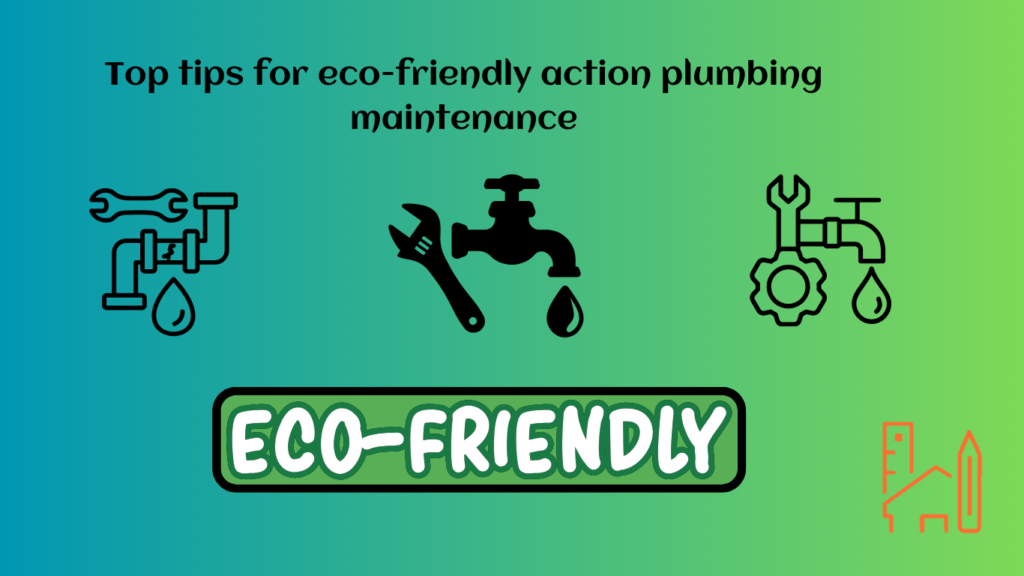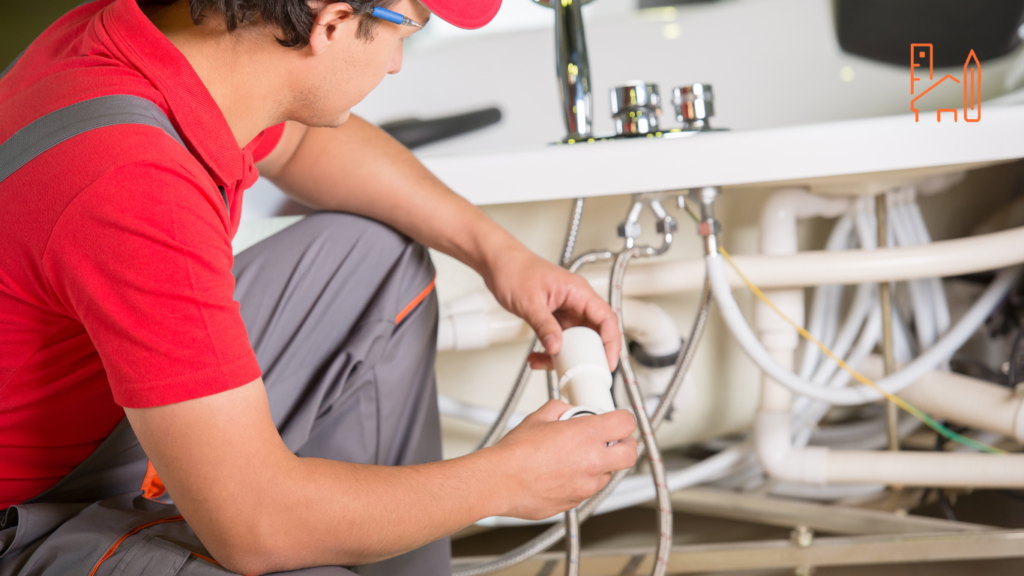Sustainability starts at home, and your plumbing system plays a vital role in reducing your environmental footprint. By adopting eco-conscious plumbing practices, you can conserve water, reduce energy consumption, and support a greener planet. This comprehensive guide provides actionable tips for sustainable plumbing maintenance while integrating the keyword “top tips for eco-friendly action plumbing maintenance” seamlessly.

1. Upgrade to High-Efficiency Fixtures
Installing high-efficiency plumbing fixtures is one of the simplest and most impactful ways to conserve water. These fixtures are designed to use significantly less water while maintaining optimal performance. Key upgrades include:
- Low-Flow Showerheads: Use up to 50% less water compared to standard models while ensuring a satisfying shower experience.
- Dual-Flush Toilets: Offer two flush options—a lower volume for liquid waste and a higher volume for solid waste—saving thousands of gallons annually.
- Faucet Aerators: Mix air with water to reduce flow without compromising water pressure, ideal for sinks.
Such upgrades are central to implementing the top tips for eco-friendly action plumbing maintenance and can substantially lower your water bill.
2. Detect and Repair Leaks Regularly
Leaks can waste gallons of water daily, often unnoticed. Proactive leak detection and repair are crucial for sustainability. Follow these steps:
- Inspect Common Leak Points: Check faucets, showerheads, and pipes for drips or wet spots.
- Monitor Your Water Meter: Turn off all water-using appliances and observe the meter; any movement indicates a leak.
- Repair Promptly: Replace faulty washers, tighten fittings, or consult a professional to fix more significant leaks.
Using smart water monitoring devices can also help identify leaks early, preventing waste and costly damage.
3. Adopt Greywater Recycling Systems
Greywater recycling involves reusing lightly used water from sinks, showers, and washing machines for non-potable purposes. Benefits include:
- Irrigating Gardens: Divert greywater to nourish your plants and lawn.
- Flushing Toilets: Reduce reliance on treated water by using recycled greywater.
- Minimizing Wastewater: Decrease the load on sewage systems and promote resource conservation.
Ensure compliance with local regulations when installing a greywater system to maximize its efficiency and safety.
4. Insulate Pipes for Efficiency
Pipe insulation is a cost-effective measure that boosts energy efficiency and prevents water wastage. Benefits include:
- Faster Hot Water Delivery: Insulated pipes maintain heat, reducing the wait time for hot water.
- Energy Savings: Lower heat loss translates to reduced energy usage and utility bills.
- Preventing Freezing: Insulation protects pipes from freezing and bursting in cold weather.
Materials such as foam or fiberglass wraps are affordable and easy to install, making them an essential component of sustainable plumbing maintenance.

5. Embrace Rainwater Harvesting
Rainwater harvesting is an excellent way to reduce reliance on municipal water supplies. Captured rainwater can be used for:
- Irrigation: Water plants and lawns sustainably.
- Cleaning: Wash cars, patios, and driveways without using treated water.
- Flushing Toilets: Divert rainwater to reduce fresh water consumption.
Install rain barrels or a more advanced rainwater collection system to harness this renewable resource effectively.
6. Install Energy-Efficient Water Heaters
Water heating accounts for a significant portion of household energy use. Upgrading to energy-efficient systems can reduce both energy consumption and costs. Consider these options:
- Tankless Water Heaters: Provide hot water on demand, eliminating standby energy losses.
- Solar Water Heaters: Use renewable solar energy to heat water, significantly reducing carbon emissions.
- Heat Pump Water Heaters: Move heat from the air to the water, offering an energy-efficient alternative.
Regular maintenance, such as flushing sediment from the tank, ensures these systems run efficiently.
7. Use Eco-Friendly Cleaning Products
Harsh chemical cleaners can harm the environment and corrode your plumbing. Opt for greener alternatives, such as:
- Natural Drain Cleaners: Baking soda and vinegar effectively clear clogs.
- Biodegradable Products: Ensure your cleaning agents break down safely in water systems.
- Enzymatic Cleaners: Use natural enzymes to break down organic buildup in pipes.
Switching to eco-friendly products aligns with top tips for eco-friendly action plumbing maintenance, promoting a healthier home and planet.
8. Select Sustainable Plumbing Materials
The materials used in your plumbing system have long-term environmental impacts. Sustainable options include:
- Copper Pipes: Durable, recyclable, and resistant to bacteria.
- PEX Pipes: Flexible and energy-efficient, with a long lifespan.
- Recycled Materials: Incorporate recycled metals or plastics to reduce raw material consumption.
By choosing sustainable materials, you ensure your plumbing system supports long-term eco-conscious goals.
9. Practice Water-Conscious Habits
Behavioral changes are as important as system upgrades in maintaining sustainable plumbing. Simple habits include:
- Turn Off Taps: Avoid running water unnecessarily while brushing teeth or washing dishes.
- Use Appliances Wisely: Run dishwashers and washing machines only with full loads.
- Collect and Reuse Water: Save cold water while waiting for it to heat and use it for plants.
These habits, combined with structural improvements, significantly reduce water and energy waste.
10. Hire Green Plumbing Professionals
Partnering with green-certified plumbers ensures your plumbing system is optimized for sustainability. These professionals can:
- Audit Your System: Identify inefficiencies and recommend eco-friendly solutions.
- Install Sustainable Systems: From greywater recycling to rainwater harvesting, they’ll ensure proper installation.
- Maintain Your System: Regular inspections and maintenance maximize efficiency and lifespan.
A qualified green plumber ensures that your plumbing system adheres to the best practices for sustainability.
Conclusion
Eco-conscious plumbing maintenance is a critical step toward sustainable living. By upgrading fixtures, adopting water-saving practices, and investing in efficient systems, you can reduce your environmental footprint and utility costs. Incorporating these top tips for eco-friendly action plumbing maintenance into your routine promotes a healthier planet while ensuring your home remains efficient and eco-friendly. Small changes lead to significant impacts—start today to make a difference for the future.